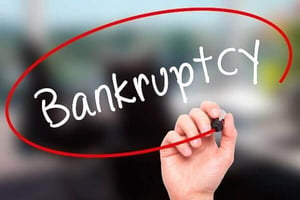 Thanks to all of the courtroom dramas we see on television, most people are terrified by the prospect of going to court. It often keeps people from going to court who need to - the idea of someone aggressively questioning them and trying to trip them up is just too intimidating. Even people in dire financial situations are afraid to file for bankruptcy because they don’t want to go to court.
Thanks to all of the courtroom dramas we see on television, most people are terrified by the prospect of going to court. It often keeps people from going to court who need to - the idea of someone aggressively questioning them and trying to trip them up is just too intimidating. Even people in dire financial situations are afraid to file for bankruptcy because they don’t want to go to court.
If you’re facing bankruptcy, don’t let these fears keep you from taking action to protect your future. First, you should understand that what you see on television is not the reality in most cases. Second, you should also be aware that bankruptcy court is even further removed from what you see on television - the matters before the court are almost always administrative or transactional in nature. Nevertheless, we understand how intimidating it can be. An experienced Minnesota bankruptcy attorney can help you through the process.
Most Cases Require Only a Single Court Appearance
In most cases, the only time you are required to go to court is to attend the 341 meeting, also known as the meeting of creditors. That said, the meeting isn’t actually held in a courtroom and it isn’t held in front of a judge. The trustee conducts the hearing, and it is typically held at a building owned by the federal government – it doesn’t even need to be in a courthouse! You could argue that it isn’t a court appearance at all, but it’s similar to a court hearing because of two details:
- You will be placed under oath; and
- You will be required to answer the trustee’s questions regarding your bankruptcy case.
In a Chapter 7 case, the hearing may be over in less than five minutes. The hearing may be a little longer in a Chapter 13 case, but you will probably be finished in under 10 minutes. Your attorney will attend the hearing with you.
The trustee will ask you some questions related to your bankruptcy case in order to verify some details of your bankruptcy case:
- To confirm that you reviewed your bankruptcy filings before signing them
- To confirm that you listed all of your debts and assets
- To discuss how you established the value your home
- To confirm whether you have made any significant transfers prior to filing for bankruptcy
- Whether you stand to inherit any money or whether anyone owes you money
The hearing is not designed to embarrass you. The intent is to confirm that you have filed for bankruptcy in good faith and that the information you have submitted is honest and accurate. Creditors are entitled to attend the hearing but rarely do so.
After the meeting of creditors, your attorney can appear on your behalf at every other hearing. You are certainly welcome to attend, but hearings are typically held during normal business hours while most people are at work.
Exceptional Circumstances May Require You to Appear in Court
While most bankruptcy cases are uneventful, some cases become contentious and turn into litigation. In those cases, you may be required to attend various hearings and even a trial. Here are some examples of instances where you may be required to appear in court:
- Show cause order. You can be ordered to appear before the court and “show cause” as to why you did something or didn’t do something. It may be because you failed to submit some documentation or meet a deadline, but it can also be because the court believes you lied in your bankruptcy pleadings or did something similarly serious.
- Disputes involving your Chapter 13 case. You may need to attend hearing over disputes involving how certain claims are being handled in your Chapter 13 plan if your testimony is required. Most of these disputes are resolved prior to the hearing.
- Adversarial proceedings. In truly contentious cases, a separate but related lawsuit is filed challenging some aspect of your case. If that happens, you will probably have to appear in court at some point. However, adversarial proceedings are usually filed only in cases where there is an allegation of fraud or some other serious issue in your bankruptcy case.
If You File Your Case Pro Se
Because you are not required to hire an attorney to file for bankruptcy, some people choose to file their own bankruptcy case. This is referred to proceeding “pro se.” If you file for bankruptcy pro se, it goes without saying that you will have to attend every hearing - the case will not be able to proceed without you, and failing to appear will likely result in your case being dismissed. This is only one of many reasons why having a Minnesota bankruptcy lawyer handling your case is beneficial.
A Minnesota Bankruptcy Attorney Can Help
At Kain & Scott, we know what it’s like to be facing bankruptcy. And while we’ll handle the court appearances, we keep you involved and informed every step of the way to make sure you understand your options and are completely comfortable with how your case is proceeding. With decades of experience, we’ve helped thousands of Minnesotans navigate the bankruptcy process and come out the other side with a fresh start. If you’d like to speak with one of our Minnesota bankruptcy attorneys about how we can help you, call us at 800-551-3292 or send us an email to schedule a free consultation.


